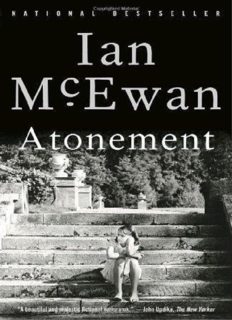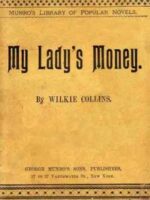THE PLAY—for which Briony had designed the posters, programs and tickets, constructed the sales booth out of a folding screen tipped on its side, and lined the collection box in red crêpe paper —was written by her in a two-day tempest of composition, causing her to miss a breakfast and a lunch. When the preparations were complete, she had nothing to do but contemplate her finished draft and wait for the appearance of her cousins from the distant north. There would be time for only one day of rehearsal before her brother arrived. At some moments chilling, at others desperately sad, the play told a tale of the heart whose message, conveyed in a rhyming prologue, was that love which did not build a foundation on good sense was doomed. The reckless passion of the heroine, Arabella, for a wicked foreign count is punished by ill fortune when she contracts cholera during an impetuous dash toward a seaside town with her intended. Deserted by him and nearly everybody else, bed-bound in a garret, she discovers in herself a sense of humor. Fortune presents her a second chance in the form of an impoverished doctor—in fact, a prince in disguise who has elected to work among the needy.
Healed by him, Arabella chooses judiciously this time, and is rewarded by reconciliation with her family and a wedding with the medical prince on “a windy sunlit day in spring.”
Mrs. Tallis read the seven pages of The Trials of Arabella in her bedroom, at her dressing table, with the author’s arm around her shoulder the whole while. Briony studied her mother’s face for every trace of shifting emotion, and Emily Tallis obliged with looks of alarm, snickers of glee and, at the end, grateful smiles and wise, affirming nods.
She took her daughter in her arms, onto her lap—ah, that hot smooth little body she remembered from its infancy, and still not gone from her, not quite yet —and said that the play was “stupendous,” and agreed instantly, murmuring into the tight whorl of the girl’s ear, that this word could be quoted on the poster which was to be on an easel in the entrance hall by the ticket booth.
Briony was hardly to know it then, but this was the project’s highest point of fulfillment. Nothing came near it for satisfaction, all else was dreams and frustration. There were moments in the summer dusk after her light was out, when she burrowed in the delicious gloom of her canopy bed, and made her heart thud with luminous, yearning fantasies, little playlets in themselves, every one of which featured Leon. In one, his big, good-natured face buckled in grief as Arabella sank in loneliness and despair. In another, there he was, cocktail in hand at some fashionable city watering hole, overheard boasting to a group of friends: Yes, my younger sister, Briony Tallis the writer, you must surely have heard of her. In a third, he punched the air in exultation as the final curtain fell, although there was no curtain, there was no possibility of a curtain. Her play was not for her cousins, it was for her brother, to celebrate his return, provoke his admiration and guide him away from his careless succession of girlfriends, toward the right form of wife, the one who would persuade him to return to the countryside, the one who would sweetly request Briony’s services as a bridesmaid. She was one of those children possessed by a desire to have the world just so.









Be the first to review “Atonement”